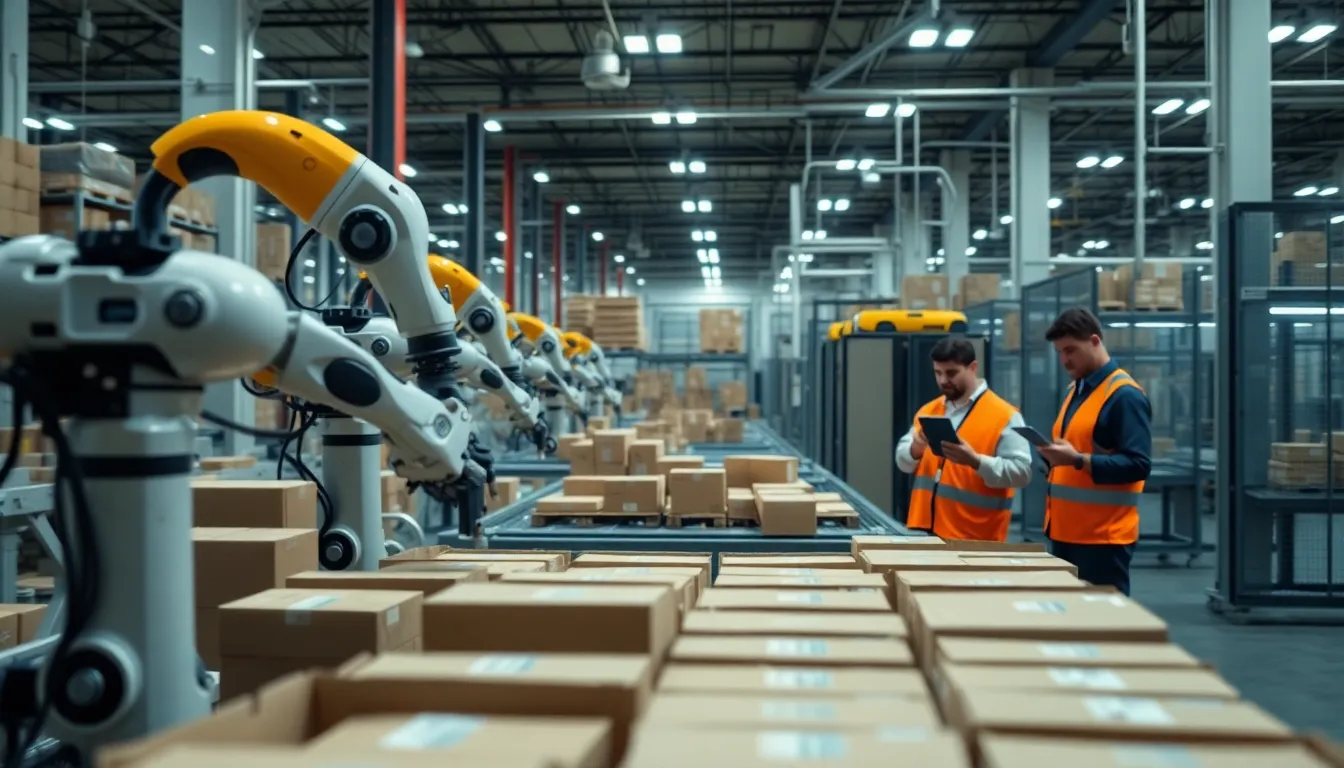Table of Contents
ToggleIn a world where instant gratification reigns supreme, supply chains are the unsung heroes working tirelessly behind the scenes. Imagine a bustling orchestra, with each instrument playing its part to deliver everything from that hot pizza to your doorstep to the latest gadget you just couldn’t resist. But what if this orchestra could play even better? Enter the emerging and trending supply chain technologies that are changing the game faster than you can say “just-in-time delivery.”
From AI-driven analytics to blockchain transparency, these innovations are not just buzzwords—they’re the secret sauce that keeps the wheels of commerce turning smoothly. As businesses scramble to keep up with consumer demands, understanding these technologies is like having a backstage pass to the future of logistics. So buckle up and get ready to explore how these advancements are reshaping the supply chain landscape, one byte at a time.
Overview of Supply Chain Technologies
Supply chain technologies encompass a range of innovations that enhance efficiency and transparency across logistics. Emerging technologies like artificial intelligence (AI), blockchain, and the Internet of Things (IoT) lead the charge in transforming traditional supply chains into smart networks.
AI-driven analytics serve as a cornerstone in modern supply chain management. These systems analyze vast amounts of data, enabling real-time decision-making and predictive insights. Companies leverage these tools for demand planning and inventory optimization.
Blockchain technology introduces a decentralized ledger system that enhances security and traceability. It ensures that every transaction is recorded and accessible, reducing fraud and improving trust among partners. Many businesses adopt blockchain for tracking products from origin to delivery.
IoT devices play a vital role in optimizing operations. With sensors placed on equipment and shipments, businesses access real-time data about their inventory and shipping conditions. This information helps in proactive maintenance and minimizing delays.
Robotic process automation (RPA) streamlines repetitive tasks. By programming bots to handle order processing and invoicing, employees focus on higher-value activities. Organizations benefit from increased accuracy and speed in these processes.
Cloud computing has revolutionized data sharing and collaboration. It provides flexible storage solutions and enhances communication between supply chain partners. Real-time access to information fosters better decision-making and synchronization across the supply chain.
Incorporating these technologies not only enhances operational efficiency but also positions businesses to respond swiftly to market fluctuations. Understanding and utilizing these advancements plays a crucial role in maintaining a competitive edge in supply chain management.
Key Trends in Supply Chain Technology

Emerging trends in supply chain technology play a vital role in enhancing efficiency and responding to consumer needs. These innovations ensure businesses stay competitive and agile.
Increased Automation
Increased automation streamlines supply chain processes significantly. Robotic systems handle tasks such as sorting and packing, reducing human error and labor costs. Automated inventory management provides real-time stock updates and alerts for low stock levels. Businesses experience faster order fulfillment with automated warehousing solutions. These advancements allow employees to focus on strategic decision-making rather than repetitive tasks.
Enhanced Data Analytics
Enhanced data analytics empowers supply chain management with deep insights. Advanced analytics tools process vast amounts of data for better demand forecasting. Businesses make informed decisions with predictive models that analyze market trends and consumer behavior. Enhanced data visualization also facilitates clearer communication among partners. Companies leverage analytics to identify inefficiencies and optimize processes for increased profitability.
Integration of Artificial Intelligence
Integration of artificial intelligence transforms supply chain operations. AI algorithms analyze data patterns to improve inventory management and logistics planning. Intelligent automation reduces lead times and increases accuracy in order processing. Businesses utilize AI for risk assessment, identifying potential disruptions before they occur. These innovations ensure a proactive approach to supply chain challenges, enhancing overall performance.
Emerging Technologies Shaping Supply Chains
Emerging technologies play a pivotal role in transforming supply chains, enhancing efficiency and transparency. Key innovations include blockchain, IoT, and robotics, each contributing uniquely to logistics.
Blockchain Technology
Blockchain technology offers a secure and transparent way to track transactions within supply chains. It uses a decentralized ledger system that reduces the risks of fraud while improving trust among partners. Data integrity is paramount, ensuring that all stakeholders maintain accurate records of transactions. Real-time visibility into the supply chain becomes possible, allowing companies to respond quickly to disruptions. With blockchain, transparency fosters accountability, leading to stronger collaborations and more efficient operations.
Internet of Things (IoT)
The Internet of Things (IoT) revolutionizes how businesses gather and utilize real-time data. Smart sensors integrated within inventory systems provide insight into stock levels and shipping conditions. Decision-makers leverage this information for better demand forecasting and inventory management. Increased connectivity among devices enhances overall operational efficiency. Additionally, IoT solutions enable organizations to monitor equipment health, thereby reducing downtime and optimizing maintenance schedules.
Robotics and Drones
Robotics and drones automate various aspects of supply chain operations, increasing productivity significantly. Robotic systems perform tasks like picking and packing, minimizing human error. Inventory management sees marked improvements through automation, freeing up valuable resources for strategic initiatives. Drones facilitate quick and efficient deliveries, especially for last-mile logistics. Both technologies support faster reaction times to market changes, ensuring businesses remain competitive amid evolving demands.
The Role of Sustainability in Supply Chain Tech
Sustainability plays an increasingly vital role in supply chain technology. Organizations adopt eco-friendly practices to reduce their environmental footprint. Companies leverage innovative technologies to enhance sustainability throughout their operations.
Artificial intelligence contributes to sustainability by optimizing resource use. AI can analyze data patterns, allowing businesses to reduce waste and improve energy efficiency. Through better demand forecasting, companies minimize excess inventory and its related environmental impact.
Blockchain technology also supports sustainability efforts. By providing transparent and traceable supply chains, blockchain enhances ethical sourcing. Companies ensure that materials come from responsible suppliers, fostering consumer trust and accountability.
The Internet of Things (IoT) aids sustainability initiatives by monitoring energy consumption. Sensors in logistics help track fuel usage and emissions, promoting greener transportation methods. Real-time data empowers businesses to make informed decisions that drive sustainability goals.
Robotic process automation boosts efficiency while reducing resource consumption. By automating repetitive tasks, companies decrease labor costs and energy usage. This streamlines processes, leading to a more sustainable operational model.
Cloud computing enhances collaboration among supply chain partners. Sharing data in real time allows for coordinated sustainability efforts. Organizations can align on sustainable practices, promoting a collective approach to reducing environmental impact.
Incorporating these technologies not only supports sustainability efforts but also improves overall efficiency. Companies that prioritize sustainable supply chain practices improve their brand reputation. Focusing on eco-friendly technologies helps businesses meet consumer demand for responsible practices.
Emerging supply chain technologies are reshaping the logistics landscape and driving efficiency across industries. By leveraging AI-driven analytics blockchain IoT and automation businesses can enhance transparency and responsiveness. These innovations not only streamline operations but also foster sustainability by optimizing resource use and reducing waste.
As companies adapt to these advancements they position themselves to meet evolving consumer expectations and navigate market challenges effectively. Embracing these technologies is no longer optional; it’s essential for maintaining a competitive edge in today’s fast-paced business environment. The future of supply chains lies in the integration of these tools which promise to create more resilient and sustainable operations.




